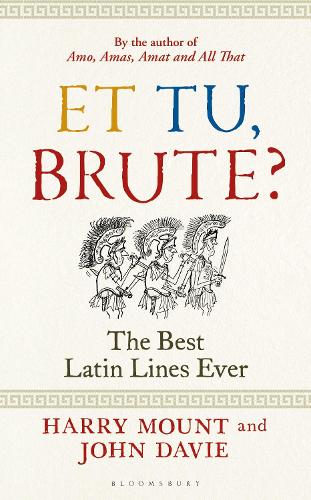
Et tu, Brute: The Best Latin Lines Ever
(Hardback)
Available Formats
Publishing Details
Et tu, Brute: The Best Latin Lines Ever
By (Author) Harry Mount
By (author) John Davie
Bloomsbury Publishing PLC
Bloomsbury Continuum
10th January 2023
United Kingdom
Classifications
General
Non Fiction
Gift and novelty books / items
478.2421
Physical Properties
Hardback
272
Width 136mm, Height 220mm, Spine 28mm
384g
Description
There are so many Latin phrases in everyday use that often we use them without understanding the background and context within which they were actually used. 'Carpe diem'; 'Stet'; 'Memento mori'; 'Et tu Brute' examples would fill a book. And often these phrases are also used in English translation: 'The dye is cast'; 'crossing the Rubicon'; 'Rome was not built in a day'. Many of these phrases are humorous, but they are also a rich source of wisdom: the wisdom of the ancients. The chapters of this book include: Lifes Misfortunes and how to deal with them; How to deal with old age (Cicero); Why Death is nothing to fear (Lucretius); The Stoic guide to life. Each chapter starts with a quotation and is lightly sprinkled with many more, with accompanying English translations. The background to each quotation is explained so that the context is fully understood. Who crossed the Rubicon and why, for example At a time of great political and social turbulence, more and more people are turning back to ancient wisdom as a guide to life. Here they are in touch with two classical scholars of distinction who have the common touch.
Reviews
Both entertaining and informative, this is not to be missed. * This England *
Theres much pleasure to be had in Et Tu, Brute...which carries a lot of learning very lightly. * The Tablet *
filled with memorable and fun facts. * The Times Literary Supplement *
highly readable the perfect approach presented with verve and wit. * The Wall Street Journal *
Author Bio
After obtaining a first class degree in Latin and Greek at Oxford University, Harry Mount embarked on life as a journalist. A frequent contributor to The Spectator, Daily Telegraph and The Times, he is now the editor of The Oldie. John Davie was for many years head of Classics at St Pauls School in London. He then moved to Trinity College, Oxford where he became tutor in Classics.
